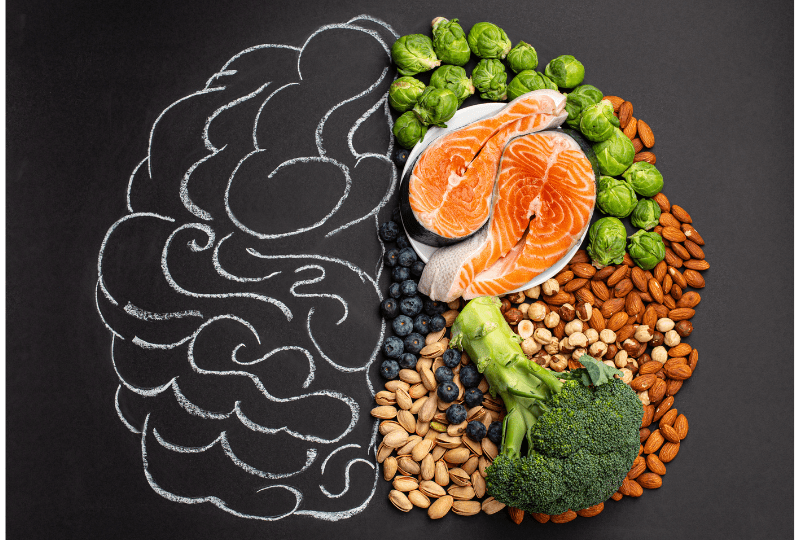Are you feeling down or overly anxious? Has your mood been particularly low recently? If so, your gut might be trying to tell you something. The link between our gut microbiome and mental health has been a topic of increasing interest over recent years. Evidence suggests that the team of microorganisms within our gut plays a significant role in how we think and feel.
Join us as we uncover the exciting connection between your gut microbiome and mental health and look at ways in which you can support both.
Table of Contents
How Does Your Gut Microbiome Influence Your Mental Health?
Have you ever had a “gut feeling” about something? While this feeling is often something we dismiss or take for granted, it might be more relevant than you think!
Despite the brain and gut seeming like distant neighbors in the body, they actually work effectively together to maintain our physical and mental well-being. This means that an unhealthy gut can affect the brain and vice versa. Let’s look at the connection between the two in more detail:
The Gut-Brain Connection
Our brain and gut are intricately linked, constantly exchanging signals. This is where our gut microbes get involved—they facilitate the production of chemicals within the brain (neurotransmitters) that transmit these signals to influence our brain function and behavior.
Our gut even has its own independent nervous system, known as the enteric nervous system (ENS), which influences our emotions, mood, and overall well-being. The ENS is often referred to as our “second brain,” given its crucial role in regulating essential bodily functions. Gut bacteria produce various neurotransmitters, including serotonin, dopamine, and GABA (gamma-aminobutyric acid), which can directly influence the ENS and its signaling pathways.
Which Mental Health Conditions are Linked to Your Gut Microbiome?
Given the intimate relationship between our gut and brain, an imbalance in our gut microbiome can significantly affect our mental health. Research supports this, showing a clear link between gut health and a range of mental health conditions.
Notably, people diagnosed with common digestive conditions, including irritable bowel syndrome (IBS) and ulcerative colitis, have a greater risk of developing mental health conditions. While it’s easy to assume that mental health struggles arise solely as a consequence of having to deal with a digestive condition, research reveals a more complex interplay. Studies have shown that the presence of specific mental health conditions, such as anxiety and depression, can actually predict the severity of digestive disorders, suggesting a more complicated relationship in the development and progression of these illnesses.
The following mental health and neurological disorders have been linked to imbalances or changes in the composition of the gut microbiome:
- Anxiety and depression
- Alzheimer’s disease and dementia
- Attention Deficit Hyperactivity Disorder (ADHD) and autism spectrum disorder (ASD)
- Bipolar disorder
- Obsessive Compulsive Disorder (OCD)
- Parkinson’s disease
- Schizophrenia
Gut Microbiome Imbalance and Neurological Conditions
Emerging evidence strongly suggests that imbalances in the gut’s microbial community may contribute to the development and progression of various neurological and neurodegenerative conditions, including Alzheimer’s disease, dementia, ADHD, ASD, and Parkinson’s disease. For example, studies have found alterations in the gut microbiota of individuals with Alzheimer’s and Parkinson’s disease, potentially influencing inflammation and neural pathways. Similarly, research highlights differences in the gut microbiome of those with ADHD and ASD. In fact, specific gut biomarkers have been identified which can accurately differentiate between a child with ASD and their neurotypical peers.
Research into these connections is ongoing, and more studies are needed to establish causality. However, the existing evidence highlights the potential of gut microbiome-based modulation as a complementary approach to traditional mental health and neurological treatments.

How Can You Improve Your Gut Microbiome to Support Your Mental Health?
The good news is that simple diet and lifestyle changes can positively affect our gut microbiome and mental well-being. Of course, it is essential to seek help from a medical professional if you experience persistent mental health issues. However, incorporating healthy habits such as eating a balanced diet, staying physically active, managing stress, and getting adequate sleep can make a meaningful difference in maintaining a healthy gut and supporting overall mental health.
So, let’s look at some simple strategies for supporting your mental health by optimizing your gut microbiome:
1. Get Your Microbiome Tested
Your first step should be to get your microbiome tested so that you can better understand its current composition. This will give you a personalized snapshot of your gut bacteria, revealing potential imbalances or deficiencies. Armed with this information, you can create a targeted approach to improving your gut health, potentially leading to positive changes in your digestive and mental well-being.
2. Optimize Your Diet

Once you get your microbiome tested, you will understand how to personalize your diet based on your unique gut health. A leading microbiome testing company, such as Enbiosis, can provide you with a comprehensive gut health report, which contains a personalized nutrition guide. This report includes a summary of data-driven food recommendations, which can be incredibly helpful in optimizing your individual dietary choices for improved gut health and mental well-being.
3. Consider Taking Prebiotic and Probiotic Supplements
Research suggests that probiotic and prebiotic supplements can help decrease the severity of mental health symptoms and improve mood. These supplements help to rebalance the gut microbiome, decreasing inflammatory responses and increasing the availability of critical neurotransmitters, including serotonin.
4. Get Plenty of Exercise
Finally, never underestimate the importance of getting plenty of exercise. We all know how good we feel after a workout! As exercise helps to increase the diversity and abundance of beneficial bacteria within the gut, this may go some way to explaining how it can have such a positive effect on our mood and emotions.
How Can Enbiosis Help?
Enbiosis can provide you with comprehensive gut microbiome analysis powered by our innovative AI algorithm. We use our advanced technology to analyze your microbiome and create a customized diet plan designed to optimize your gut ecosystem. By identifying the specific nutrients that promote the growth of beneficial bacteria while discouraging the growth of harmful ones, we can help you to achieve a healthier gut and improve your mental well-being.
Contact Enbiosis today to find out more.


